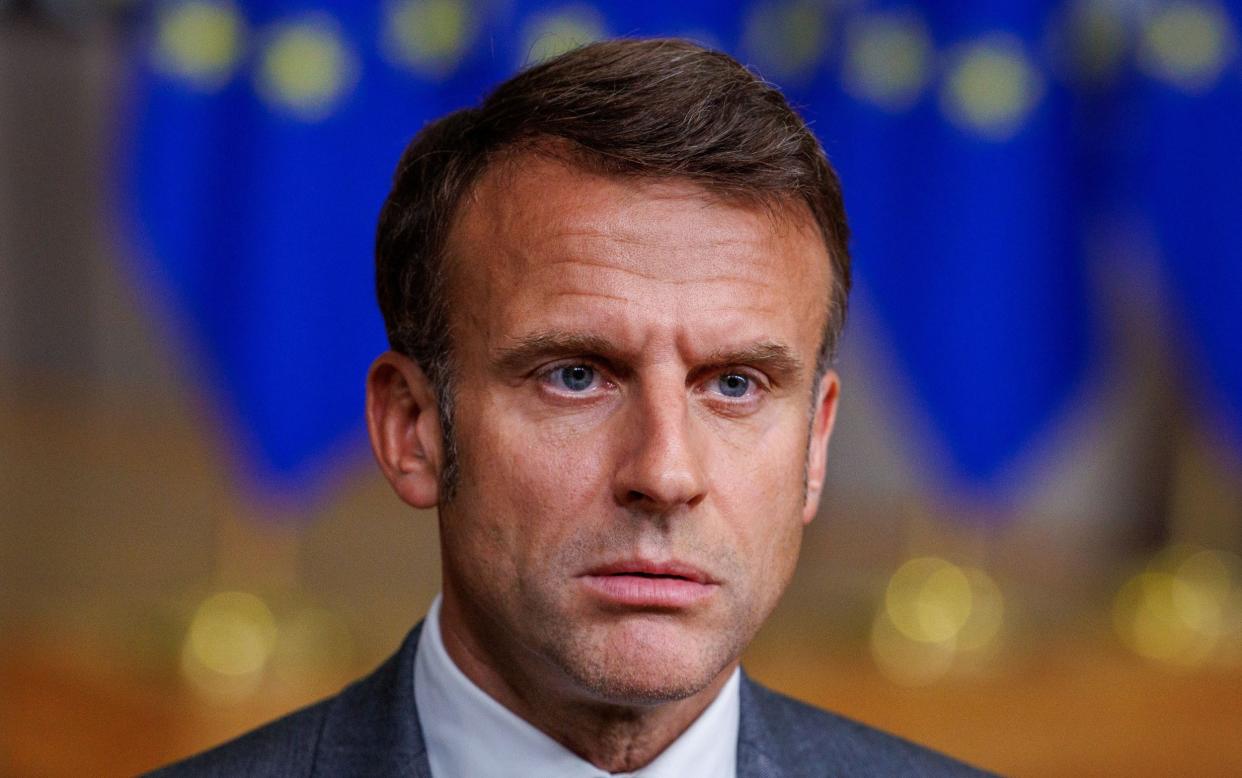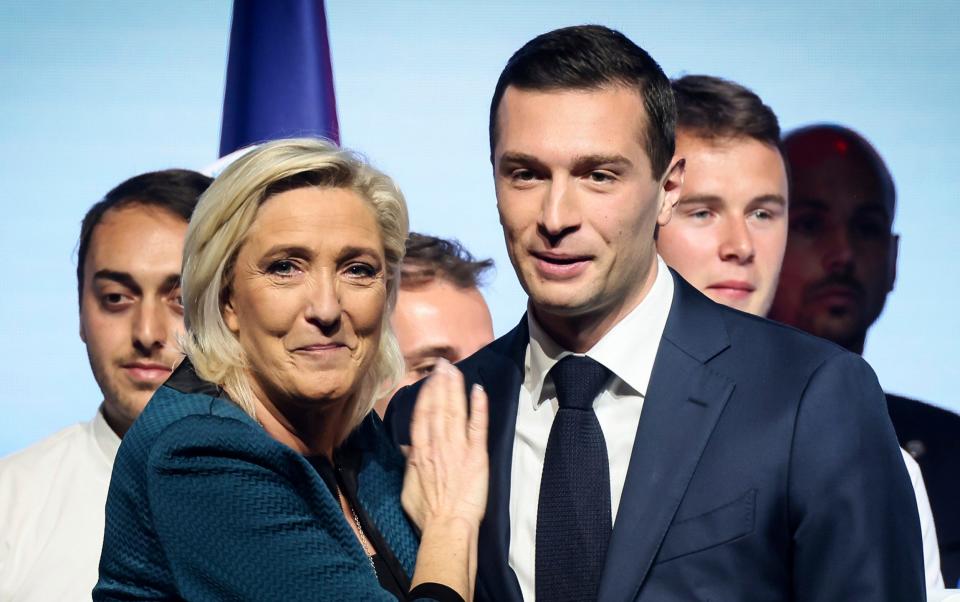A National Rally government is now the best of bad economic options for France

Markets are betting that Emmanuel Macron will somehow keep the show on the road despite the carpet-bombing of the political centre on Sunday. This is a heroically complacent interpretation of the political drama unfolding in France.
Did they not hear the primordial scream of the French nation? Almost two thirds voted for blocs dominated by “anti-regime” parties. They did so amid the highest turn-out in over 40 years and against a background of pre-insurrectional political fever.
“We are in a very unstable situation that has been building up for years and it’s becoming more and more volcanic. It could flare up at any moment, and anything could be the catalyst,” said General Bertrand Cavallier, a former top commander of the gendarmerie.
The late Coralie Delaume, author of Sovereignty, Europe, and the People, long argued that France’s democracy suffered serious damage below the waterline in the early 2000s, when the nation rejected the European constitution in a referendum only to see it smuggled through later, without a vote, under the guise of the Lisbon Treaty. Pervasive cynicism set in.
Mr Macron is scarcely a democrat at all. He refused to share power after losing parliament in 2022, imposing his agenda by executive decree, at times against massive opposition. He seems to think he can keep governing in this fashion even now.
He is angling for a bourgeois bloc based on the smoking ruins of his Renaissance party, with a few centrist allies and deputies scavenged from the centre-Left and centre-Right parties that he has spent seven years trying to destroy. This can never command a majority.
“There is no longer any allegiance towards the president. His political authority has been annihilated,” said François Goulard, treasurer of the Horizons party, a former ally.

Yet investors are relieved that the sky has not yet fallen. The euro has rallied. So has the CAC 40 index of equities. Risk spreads on French debt have narrowed.
It is never easy to fathom the collective mind of Mr Market. Some seem relieved that the Left-wing Popular Front no longer has any chance of winning an absolute majority with its Trotskyist class war, others that Marine Le Pen’s National Rally will probably not win one either.
What they will get instead is the total paralysis of a hung parliament based on a phantom centre with no legitimacy, limping from one crisis to another as the French economy slips into a second lost decade.
It is not obvious to me why markets think that deadlock would be better for French assets than a Rally government with an absolute majority, eager to work with big business and prove itself better than a menagerie of crackpots and economic illiterates.
All signs are that Le Pen and her dauphin, Jordan Bardella, would ditch their offending economic policies in a heartbeat on taking office, concentrating instead on migration and the culture war, along the lines of the post-fascist Meloni model in Italy.
To the extent that Mr Macron succeeds in forming an electoral pact with his enemies on the Left to block Le Pen, he ensures France will not have a functioning government able to stop runaway fiscal deficits or to grasp the nettle on anything.
Economic growth under Mr Macron has been flattered by loose fiscal policy. Other countries have been tightening their belts since Covid and the energy bail-outs. France has hardly begun. The structural fiscal deficit is the worst of any major country in Europe.
“The average budget deficit in Germany has been 0.5pc since 2012. In France it has been 4.7pc,” said Professor Thomas Mayer, author of Europe’s Unfinished Currency.
Over that period, public debt has fallen from 81pc to 64pc of GDP in Germany but risen from 92pc to 111pc in France, and is still rising. Combined public and private debt is 320pc of GDP in France versus 183pc in Germany.
This divergence between the two core members of monetary union is already near the point of no return. It would take draconian retrenchment at this juncture to restore German confidence in French fitness for euro membership.
German finance minister Christian Lindner fired a cannon shot last week, warning that any move by the European Central Bank to rescue France by propping up French debt would raise serious “legal and constitutional” questions. Indeed it would: France fails all five legal conditions for use of the ECB’s anti-spread shield (TPI).
Mr Macron has run out of road. Having failed to knock France into fiscal shape over the last seven years, he has no hope of doing so now from a worse position, with no political capital or workable government.
His mad electoral gamble has killed any chance that Germany will agree to eurobonds and fiscal union, and without joint debt issuance his beloved euro is on borrowed time.
It has been clear for two years that Berlin will not allow the EU’s one-off Covid fund to evolve into a permanent EU treasury. But it was not clear to Japanese bondholders or Asian sovereign wealth funds.
I suspect that it will become clear to them soon, and that will change broader perceptions of Club Med debt solvency. If they are not burning Mr Macron’s effigy in Rome, Madrid, and Lisbon, they ought to be.
Le Pen has a shopping list of policies that clash head-on with the EU Acquis. Her party would combine in a blocking minority with souverainistes in Italy, Holland and central Europe to halt further EU integration. But Mr Macron has already set back his cause so badly that much of this is going to happen anyway.
“None of his plans for advancing the cause of Europe counts for anything any more,” said Nils Schmidt, the foreign policy chief for the German Social Democrats in the Bundestag.
I leave it to political scientists to judge whether it is a good idea to try to impose a cordon sanitaire against the largest political force in the country, mobilising all means to disqualify a movement that is operating entirely within the constitutional rules of the country.
How long can the Paris establishment and media keep dredging up the past ties of dead men to Vichy, when the modern National Rally is led by a 28-year-old TikTok child of Italian and Algerian immigrants?
As a matter of strict economics, it strikes me that a Bardella government in the Meloni mould is now the best of bad options for France and for Europe.
Markets may be celebrating that he will not be premier after all next week. But what on earth do they think they are going to get in his stead?
This article is an extract from The Telegraph’s Economic Intelligence newsletter. Sign up here to get exclusive insight from two of the UK’s leading economic commentators – Ambrose Evans-Pritchard and Jeremy Warner – delivered direct to your inbox every Tuesday

 Yahoo News
Yahoo News 
